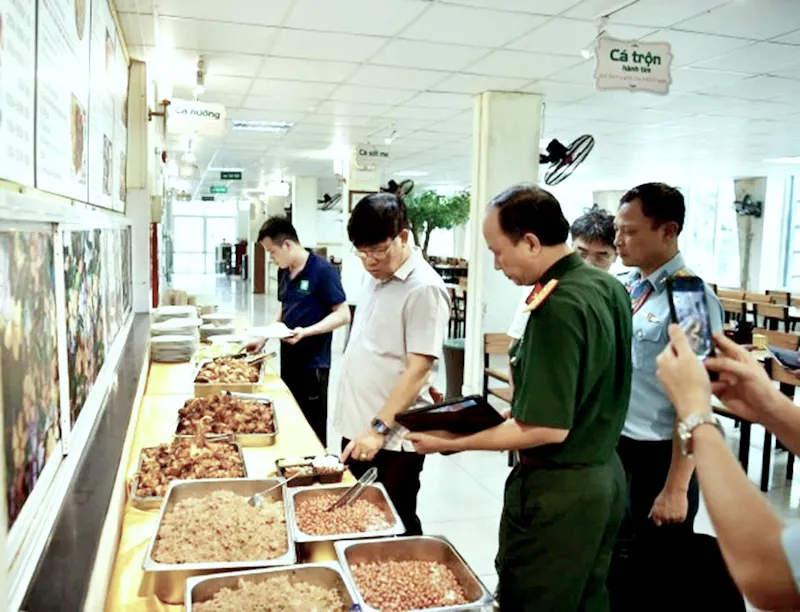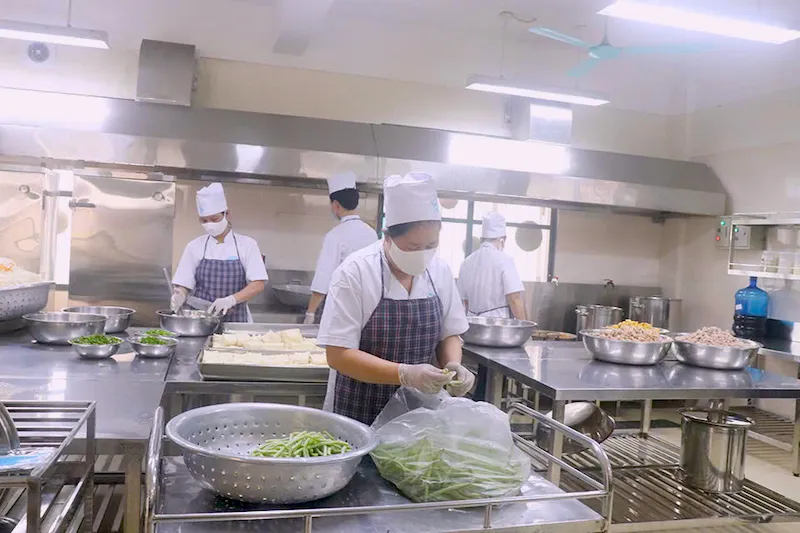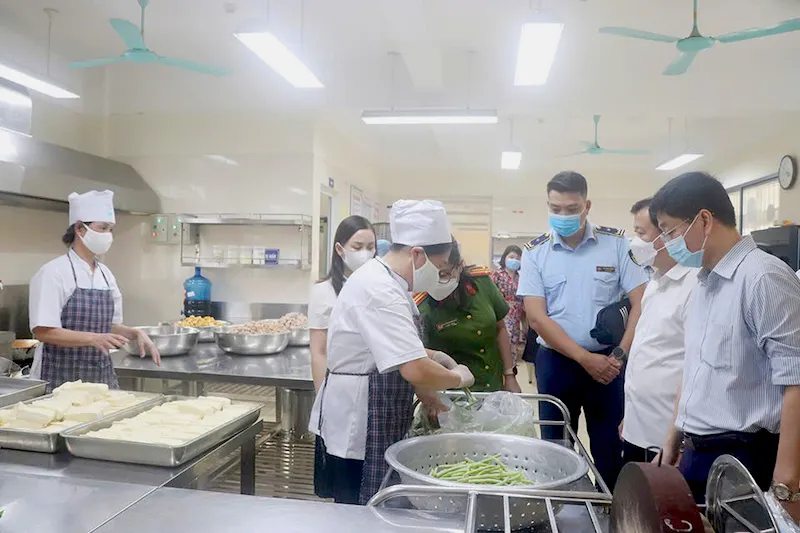Hanoi health experts warn of risk of cross-contamination through food waste
Cross-infection of certain diseases is a risk associated with using someone else's leftover food to feed oneself. These infections can spread from the first person to the person eating later.
Local health experts warn that eating left overs from previous meals, as recently reported at Hanoi University of Science and Technology, significantly increases the risk of spreading viruses and bacteria. The practice poses a serious health threat to individuals, as improper storage and handling of leftover food can lead to contamination.
Experts emphasize that proper hygiene and storage are critical to protecting public health and reducing the risk of infection associated with reused food.
Unbelievable incidents
| Inspection of the canteen at Hanoi University of Science and Technology on October 8. Photos: Thanh Binh/The Hanoi Times |
Students at the Hanoi University of Science and Technology recently reported to the media that they were served food left over from the previous group's meal about an hour earlier during their national defense education classes.
There have been similar incidents in the past. As a result, there are ongoing concerns about food safety in the community.
After the Lunar New Year 2024, a Facebook video surfaced showing a woman in the northern province of Thai Binh selling sugarcane juice made from the leftovers of previous customers, even reusing the same straws.
A noodle shop owner in the southern province of Khanh Hoa and a rice seller in the central province of Binh Dinh were also denounced for practices similar to the sugarcane seller.
Health experts warn that reusing food scraps poses significant risks, including the potential for cross-contamination and the spread of several diseases, including influenza, measles, chickenpox, rubella, tuberculosis, herpes, and meningococcal disease.
Increased risk of virus and bacteria spread
| To reduce leftovers, cooks should calculate food quantities accurately. |
Associate Professor Nguyen Duy Thinh, a former lecturer at the Hanoi University of Science and Technology's Institute of Biotechnology and Food Technology, warns that reusing previously used food can heighten the chances of spreading viruses and bacteria, especially if the leftovers are improperly stored.
Dr. Chu Thi Tuyet, from the Nutrition Department at Huu Nghi Hospital in Hanoi, points out that cooked food is only safe to eat within two hours of preparation and can spoil quickly if kept at temperatures between 4 and 60 degrees Celsius. This range is particularly dangerous because it allows harmful bacteria to proliferate, increasing the risk of foodborne illness.
Director of the Hanoi Sub-Department of Food Safety and Hygiene, Dang Thanh Phong, said that everyone involved in food processing must fully adhere to the some "golden" rules to prevent food poisoning in the kitchen.
| Dang Thanh Phong, Head of the Hanoi Food Safety Department, leads a team to inspect a local school kitchen. |
He advised people to use caution when storing cooked food. He recommended eating them soon after preparation and making sure to fully reheat any leftovers before eating. Keeping raw and cooked foods separate is also important to avoid cross-contamination.
Phong said it is equally important to use clean water when preparing food and beverages. "People should also avoid using the same utensils for raw and cooked ingredients, wash hands before preparing and eating food, and keep kitchens and cooking utensils clean," he added.
In addition, health experts recommend that cooks accurately estimate the amount of food needed for their families or groups to minimize the need to reuse leftovers. By following these guidelines, people can significantly reduce the risk of foodborne illness and ensure safer food practices in their kitchens.
Healthcare experts noted that while recycling leftovers may be a sensible and sustainable decision, food safety protocols must come first.
Emergency food poisoning guidelines: Health experts If you have eaten food that shows signs of spoilage, or if you suspect food poisoning, it is important not to eat the food. Any leftover food, along with any vomit or urine, should be preserved for testing. In addition, it is imperative to immediately notify the nearest health authority to facilitate timely emergency care for the affected individual. The first step in treating suspected food poisoning is to induce vomiting to expel the ingested substances. This helps prevent the absorption of toxins in the intestines, neutralizes the poison, and protects the stomach lining. Prompt action can be critical in minimizing the health risks associated with foodborne illness. Vietnam's commitment to sustainable food systems gains international praise A World Bank report showed that for every 10 tons of waste generated in Vietnam, five to eight tons consist of biodegradable organic waste, primarily food waste. The report highlights that more developed countries tend to have a lower percentage of food waste in their overall waste composition, averaging 32%. In contrast, less developed countries, like Vietnam, show a higher average of 57% food waste. This discrepancy underscores the need for improved waste management practices and greater awareness of food waste issues in developing nations. In Vietnam, the agricultural and aquatic products sector experiences overall losses ranging from 20% to 25%. This translates to approximately 8.8 million tons of wasted products, valued at around US$3.9 billion, which accounts for about 2% of the country’s GDP and 12% of the agricultural sector's GDP, according to a recent report from the Food and Agriculture Organization (FAO). Rémi Nono Womdim, FAO Representative in Vietnam, emphasized: “As the global population increases, the demand for food rises. Food loss and waste reduction becomes an urgent task for all. Countries must take action to reduce food loss and waste.” The FAO Representative highly appreciated Vietnam's commitments to reduce Food loss ád waste (FLW). In particular, Decision 300 of the Government on transforming the FLW system to be transparent, responsible and sustainable has been highly appreciated by the international community. “Reducing food loss and waste has become an urgent task for everyone. We hope that strong and comprehensive efforts to reduce food loss and waste, lead to the transformation to more efficient, inclusive, resilient, and sustainable agrifood systems for better production, better nutrition, a better environment, and a better life, leaving no one behind,” he emp |














